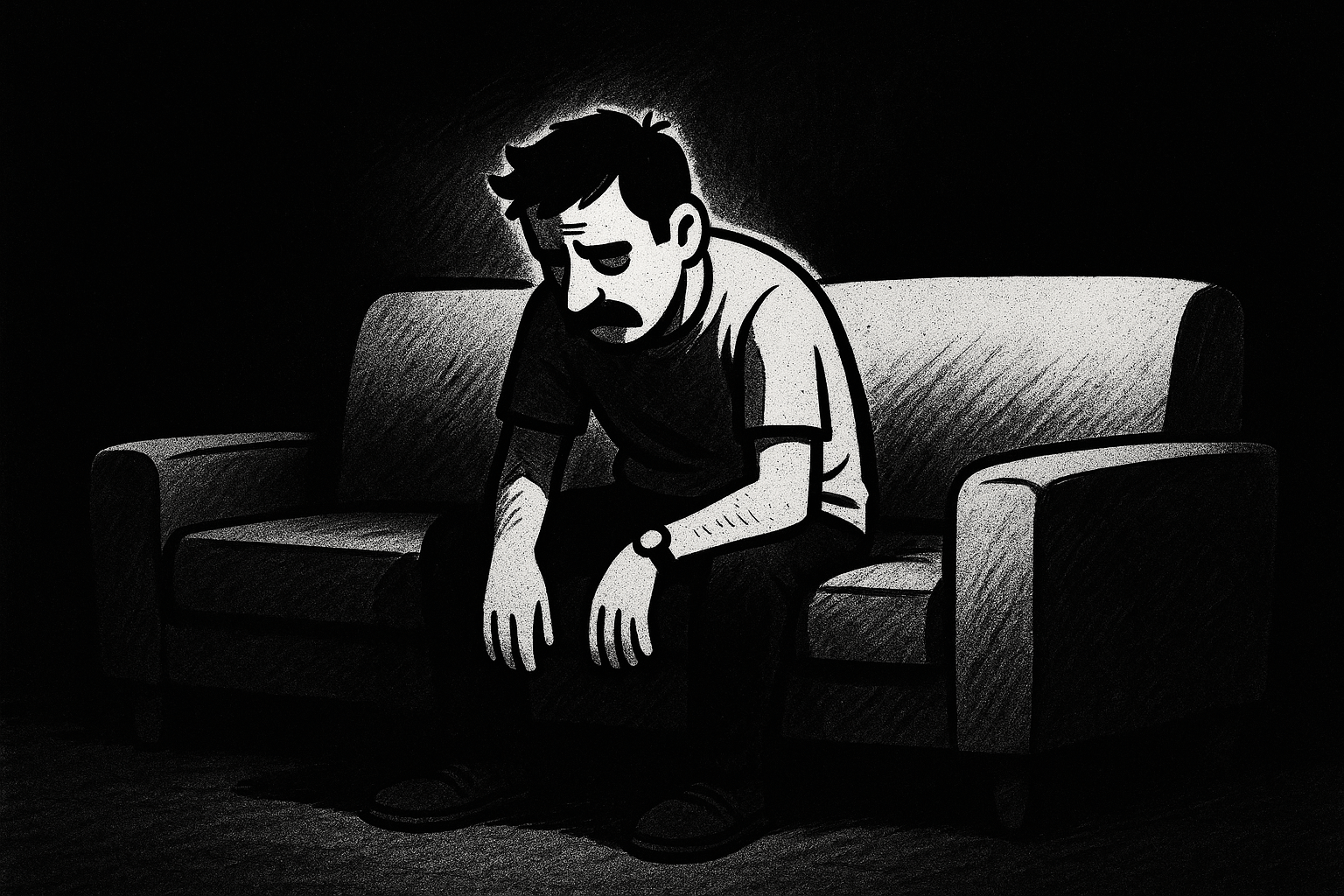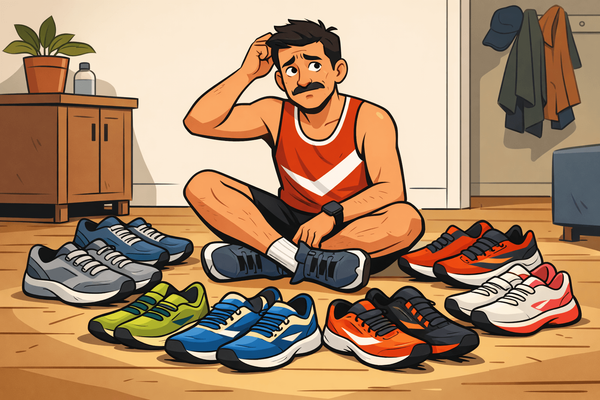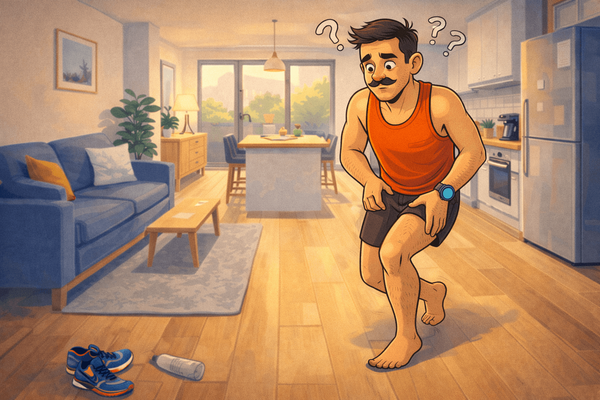Running away from depression: escaping the meaningless of it all
Running won’t solve everything, but sometimes literally running away from your problems is a decent start.

Depression isn’t just feeling a bit low. It isn’t “blue Monday” or “a case of the Sundays.” It’s lying in bed at 3pm in the same clothes as yesterday because the thought of brushing your teeth feels like dragging a corpse across the room — and the corpse is you. If you’re reading this while wondering if you’ll ever care about anything again, that’s normal. Depression makes the smallest task feel impossible. Running is one way to prove it wrong, one pointless shuffle at a time.
What does it mean to be depressed?
People often mistake depression for sadness, but sadness has energy. Depression is the absence of any energy or emotion. It’s the shower you don’t take, the text you don’t answer, the plate you don’t wash. It’s living like a ghost in your own house with no sense of purpose, belonging or reason to exist.
And here’s the cruelest part: the very things that will help — movement, daylight, food, conversation — are the things depression convinces you are impossible.
What happens to your body when you’re depressed
When we are depressed, it affects the chemistry of our brain as well as our physical health. Some healthcare professionals (specially in big pharma) will argue that brain chemistry is the source of all your problems and therefore restoring the balance in your brain will solve your depression. If you have ever been on SSRIs, you will know it can be a great tool for coping with depression: but that’s all it does. It is unlikely to cure your depression on its own. And it can come with some nasty side effects too.
The brain chemistry of depression
Levels of serotonin and dopamine, the neurotransmitters that regulate mood and motivation, are often low when you are depressed. Meanwhile Cortisol, the stress hormone, is often high. Depression is linked with changes in the balance of these chemicals, making even basic decisions feel harder than they should.
There’s also the matter of BDNF — brain-derived neurotrophic factor, a protein that helps neurons grow, connect, and repair. Low BDNF is strongly associated with depression. In other words, depression isn’t just a mood state — it’s your brain literally struggling to rewire itself.
The physical
Depression doesn’t just sit in the mind; it drags down the body too. Fatigue is constant, but it’s not the sort of tiredness a nap fixes. Muscles feel heavy and aches creep in without injury. Sleep becomes fragmented — either too much or none at all — and mornings arrive like punishment rather than renewal. Appetite often vanishes or spikes in chaotic binges.
The mental
Emotionally, depression is like having the volume knob ripped off your brain. Joy, curiosity, even anger — all turned down to static. People imagine depression is weeping into a pillow, but the truth is more sinister: it’s staring at the wall for six hours because nothing matters enough to move. Sadness at least feels alive.
How running combats depression
Running won’t turn your life into a highlight reel. It won’t fix the things that broke you, and it won’t make every morning worth getting up for. What it does is prove, in the bleakest moments, that movement is still possible. That you can still do something when your brain insists you can’t.
Physiologically, running attacks depression on multiple fronts, sometimes more effectively than pills. Across multiple trials, exercise performed about as well as psychotherapy and medication in reducing depressive symptoms. Where SSRIs flip one or two switches, running yanks at the whole fuse box:
- It gets you out of the house. Even if you only go for a 2 minute light jog around the block, that’s 2 minutes of day light and fresh air that you wouldn’t have got under your duvet.
- Running gives you endorphins. Sure, it might not feel like it while you’re huffing and puffing like you just smoked a pack of 20 and feel like you want to collapse and die. But hey, you’re feeling something.
- Exercise increases serotonin and dopamine. In other words, it gives you the same neurotransmitters as traditional antidepressants and it can be just as effective. And sure, you could just take a pill instead of going for a run because that might sound easier, but the run won’t cause you night sweats or dry up your sex life.
- It will help you sleep better. Exercise can greatly improve your sleep, because you’re actually exhausting your body. Plus getting outside into daylight helps your body clock stay tuned to the real world.
- Your stress response chills out. All that cortisol actually goes to good use when you run, because instead of stewing in your bloodstream making you feel like you’re under attack from invisible wolves, it finally gets burned off. Running hijacks the fight-or-flight system, forces the cortisol surge into action, and leaves you with a body that’s calmer afterwards. Suddenly, replying to a message isn’t a life-or-death scenario — it’s just a message.
- It might make you feel things again. If you’re a complete beginner, you will probably hate running, with a passion. And that passion is why you will lace up and go out again, and again, and again. Think of it as self-harm, and let yourself really feel how much you hate it. One day you might just learn to love it instead.
Running doesn’t magically hand out happiness. What it does is chip away at the stranglehold depression has on your mind and body. Two minutes today might feel pointless, but two minutes tomorrow, and the day after that, is momentum. Depression feeds on stasis. Running — even if it’s ugly, slow, and joyless — is the smallest crack in the wall depression builds around you.
Practical tips for exercising with depression
When you're deep into your depression, the advice to “just exercise” can sound like a sick joke. So here are a few ways to make it seem less impossible:
- Shrink the goal. Don’t aim for a 5k. Don’t even aim for a kilometre. Aim for shoes on, door open, walk down the street. If you run 20 metres and stop, that's a win.
- Routine over intensity. Depression loves days that blur into nothing. A two-minute shuffle every day is more useful than one big “motivated” run you never repeat.
- Give yourself an ‘out’. Depression can tear you down and tell you you’re not good enough, so why even bother. So give yourself an out: if after 5 minutes you want to stop, you stop. And that's still a win, because you made it out of the house.
- Use spite. Don't expect to love running. In fact you'll probably hate it. Think of it as self-harm that accidentally counts as cardio. The hate will get you moving, and sometimes that’s enough.
Getting support for your depression
Sometimes you can literally run away from your problems — but sometimes you can’t do it alone. That might mean talking to a GP, starting therapy, or taking medication alongside exercise.
If you are in the UK and struggling:
- Samaritans: Contact a Samaritan any time
- Mind: mind.org.uk offers resources and support.
- NHS: Speak to your GP for access to talking therapies and medication.
If you are outside the UK, check local crisis lines or helplines — someone will listen.





